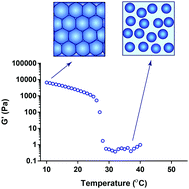LCST polymers with UCST behavior†
Abstract
In this study, temperature dependent behavior of dense dispersions of core crosslinked flower-like micelles is investigated. Micelles were prepared by mixing aqueous solutions of two ABA block copolymers with PEG B-blocks and thermosensitive A-blocks containing PNIPAM and crosslinkable moieties. At a temperature above the lower critical solution temperature (LCST), self-assembly of the polymers resulted in the formation of flower-like micelles with a hydrophilic PEG shell and a hydrophobic core. The micellar core was stabilized by native chemical ligation (NCL). Above the LCST, micelles displayed a radius of ∼35 nm, while a radius of ∼48 nm was found below the LCST due to hydration of the PNIPAM core. Concentrated dispersions of these micelles (≥7.5 wt%) showed glassy state behavior below a critical temperature (Tc: 28 °C) which is close to the LCST of the polymers. Below this Tc, the increase in the micelle volume resulted in compression of micelles together above a certain concentration and formation of a glass. We quantified and compared micelle packing at different concentrations and temperatures. The storage moduli (G′) of the dispersions showed a universal dependence on the effective volume fraction, which increased substantially above a certain effective volume fraction of φ = 1.2. Furthermore, a disordered lattice model describing this behavior fitted the experimental data and revealed a critical volume fraction of φc = 1.31 close to the experimental value of φ = 1.2. The findings reported provide insights for the molecular design of novel thermosensitive PNIPAM nanoparticles with tunable structural and mechanical properties.



 Please wait while we load your content...
Please wait while we load your content...